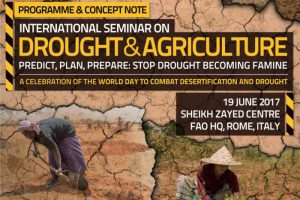 FutureWater has presented work in Vietnam on the development of a drought information system, during a high-level event at UN Food and Agriculture Organization (FAO) headquarters, gathering specialists from all over the world. The international seminar on drought organized by Iran, the Netherlands, and FAO in Rome aimed to catalyse a renewed international push to tackle the many impacts of drought, which drive not only hunger and instability but cause economic losses up to $8 billion each annually. The need for a global drought re-boot is pressing. As the planet’s climate changes, severe dry-spells are becoming more and more frequent. Since the 1970s, the land area in the world affected by situations of drought has doubled. The burden is especially high in developing countries, where agriculture remains an economic mainstay. Over 80 percent of damage and losses caused by drought are born by agriculture in the developing world, FAO studies have shown.
FutureWater has presented work in Vietnam on the development of a drought information system, during a high-level event at UN Food and Agriculture Organization (FAO) headquarters, gathering specialists from all over the world. The international seminar on drought organized by Iran, the Netherlands, and FAO in Rome aimed to catalyse a renewed international push to tackle the many impacts of drought, which drive not only hunger and instability but cause economic losses up to $8 billion each annually. The need for a global drought re-boot is pressing. As the planet’s climate changes, severe dry-spells are becoming more and more frequent. Since the 1970s, the land area in the world affected by situations of drought has doubled. The burden is especially high in developing countries, where agriculture remains an economic mainstay. Over 80 percent of damage and losses caused by drought are born by agriculture in the developing world, FAO studies have shown.
During the seminar, experts from the academic, science, humanitarian, and policymaking communities took part in a number of break-out sessions focusing on what needs to change in terms of drought management and how to make that change happen; ways to connect farmers to improved technologies to better cope; options for shifting from reactive to proactive responses, and how to slot drought management into the 2030 development agenda.
FutureWater presented the Drought Monitoring and Impact Assessment Toolbox (DMIAT) developed by FutureWater built for the Mekong River Commission, using a mixture of observations, most of these based on readily available satellite information. The DMIAT tool was also applied in the Red River Basin in Vietnam, together with an operational high-resolution rainfall downscaling tool. For each of the drought phases, the tool provides a set of indicators that can be tailored to local needs of users and sectors.
FutureWater stressed to close the so-called drought management cycle in Vietnam, by carrying out a post-event drought evaluation of the severe 2016 drought the country suffered, carrying out cross-sectoral drought risk assessments focusing on vulnerable communities and including mitigation actions, and improving on the implementation of drought information systems.
You can watch FutureWater’s presentation in the video below:

